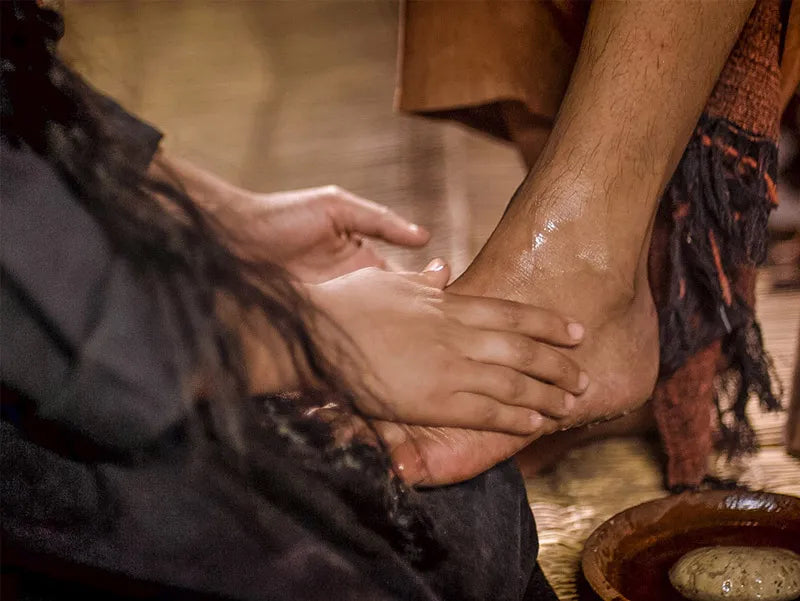
How Many Times Was Jesus Anointed?
If you have read through the Gospels, you may be familiar with the stories of Jesus being anointed with oil. Upon reading the accounts in the different books, one might be led to believe they refer to the same instance. However, closer inspection reveals that this event was recorded three times.
Two of the instances in which Jesus is anointed with oil occurred before His crucifixion. Is it significant that he was anointed during this time period?
The two occasions
Upon closer examination of the accounts of Jesus being anointed with oil before entering Jerusalem, it appears that this was done on two separate occasions.
We read about this event in John six days before Passover.
Jesus went to Bethany six days before Passover to see Lazarus, whom he had raised from the dead six days earlier. He was served dinner there six days before Passover. At the table, Martha served, and Lazarus was one of those reclining with him.
Thus, Mary took a pound of nard-based ointment and anointed Jesus' feet with it, wiping them with her hair and anointing them. The perfume filled the house with its scent.
But Judas Iscariot, one of his disciples (he who was about to betray him), said, “Why was this ointment not sold for three hundred denarii and given to the poor?” He said this, not because he cared about the poor, but because he was a thief, and having charge of the moneybag he used to help himself to what was put into it.
Jesus said, “Leave her alone so that she may keep it for the day of my burial. For the poor you always have with you, but you do not always have me.” John 12:1-8
From Mark's account, the anointing with oil occurs four days later, just two days before Passover. In this instance, the anointing occurs in the house of Simon the leper.
It was now two days before the Passover and the Feast of Unleavened Bread. And the chief priests and the scribes were seeking how to arrest him by stealth and kill him, for they said, “Not during the feast, lest there be an uproar from the people.”
And while he was at Bethany in the house of Simon the leper, as he was reclining at table, a woman came with an alabaster flask of ointment of pure nard, very costly, and she broke the flask and poured it over his head.
But Jesus said, “Leave her alone. Why do you trouble her? She has done a beautiful thing to me. For you always have the poor with you, and whenever you want, you can do good for them. But you will not always have me. She has done what she could; she has anointed my body beforehand for burial. And truly, I say to you, wherever the gospel is proclaimed in the whole world, what she has done will be told in memory of her.” Mark 14:1-9
So what’s happening
We notice that the same pure nard perfume is being used in both cases (see footnote), however, the applications are very different. In the first instance, the oil is rubbed into the feet of Jesus, whereas in the second instance it is poured over his head. This is a subtle, yet significant difference.
Some present were angered by the waste of perfume worth more than a year's salary in its sale and distribution. As a result, they severely rebuked her.
Jesus responded by telling them to leave her alone, stating that she had done something beautiful for him. As long as you have the poor with you, you can help them whenever you wish, but I will not always be there for you. Pouring perfume on His body beforehand, she prepared Jesus for burial as best she could.
When Jesus was rubbed on His feet or oil was poured on His head with pure nard, he said that the person doing it was preparing him for burial.
Understanding the culture
Something is happening here that is more obvious to the Hebrew people than it is to us. Traditionally, it was hospitable to provide water in a bowl to guests of your house who had just walked through the dusty byways of Israel. Droplets of perfume would be added to that water to create a pleasant aroma. However, you should not be wasteful in the amount that you add because in the Torah you were commanded not to be wasteful.
When you celebrate someone coming to your house, it is okay to use perfume, but you should not use pure nard. Here's why. This was considered waste, so if you were wasting resources, you were violating a Torah commandment.
How did Jesus respond to both situations? It is not being applied to My feet or poured on My head to celebrate Me, but rather as an act of mourning for My burial. He says this is not an occasion for celebration or rejoicing. As this is an act of mourning, it complies with the law.
Jesus was called a Master of Haggadah, which means a teacher of parables and stories. We find ourselves in all of Jesus' stories because they reveal truths about kingdom life.
Choosing the Passover lamb
Six days before Passover, the lambs were selected. Then they could be brought in, often into the family home, and inspected for five days. The legs, ankles, and feet were carefully examined to ensure that they were free of blemishes, as they are easily damaged or marked on the rocky hillsides. The anointing oil would then be rubbed into the ankles and feet, after which they would be examined for another five days.
So six days before Passover, Jesus is at someone's house in Bethany and is anointed for burial through the application of pure nard on His feet and ankles. That was His first anointing before His crucifixion.
Two days before Passover, he received a second anointing. To announce that they were free from disease or blemishes, the Passover lamb was anointed a second time on their heads. This is in contrast to the first time, when they were on their feet six days earlier. Two days before His execution, Jesus was anointed on the head to indicate that he was well, without illness or defect.
Passover lambs were first anointed on the feet six days before Passover, then on the head two days before, and then they were sacrificed at the ninth hour on Passover (which is Nissan 14).
Jesus and His twelve disciples returned to Jerusalem from Bethany the next day following His second anointing to take part in the Passover meal. The following day saw His arrest, trial and crucifixion when Jesus died around 3pm, the same afternoon that the Passover lambs were killed.
Footnotes
Summary of the three anointings
- At the beginning of Jesus' ministry, an unnamed woman at the home of Simon, a wealthy Pharisee, anointed His feet with ointment and wiped them with her hair. Luke 7:36-38
- On the 9th day of Nisan, Mary of Bethany anointed Jesus' feet and wiped them with her hair. On the 10th of Nisan, the day when the sacrificial lambs were to be chosen (Exodus 12:3), Jesus rode into Jerusalem-the sacrificial Lamb of God, there for all to see and judge His perfection (Jn 12:1-3).
- Jesus' head was anointed by an unidentified woman at the home of Simon the Leper in Bethany two days before the Passover, on the 13th day of Nisan (Matthew 26:1-16; Mark 14:1-11).
Spikenard, which also is known by the names of nard, nardin, and muskroot, is an essential oil that is amber in color and derived from plants. From India to Europe, the oil has been used as a perfume, a medicine, and in religious contexts since ancient times. The plants used in manufacturing historic spikenard are unclear; Nardostachys jatamansi (the modern definition), lavender from the Middle East, Alpine spikenard from Europe, and possibly lemongrass have been suggested as candidates, and it is likely that different plants were used at different times and places.
Both the Old Testament and the New Testament contain references to the spikenard, and it is associated with Saint Joseph in Catholic iconography. Pope Francis' coat of arms includes the spikenard with this meaning in mind.


Leave a comment
This site is protected by hCaptcha and the hCaptcha Privacy Policy and Terms of Service apply.